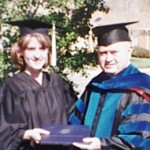 While doing post-doctoral studies in chemistry at a major mid-western university, my wife and I attended the local ward. The ward was composed of approximately 50/50 university people and townspeople. At the time, I was an ordained Seventy in the priesthood (this was during the period of time when there were Seventy’s Quorums in the individual stakes). The number of Seventies and High Priests in our ward was relatively small and so we met together during priesthood time.
While doing post-doctoral studies in chemistry at a major mid-western university, my wife and I attended the local ward. The ward was composed of approximately 50/50 university people and townspeople. At the time, I was an ordained Seventy in the priesthood (this was during the period of time when there were Seventy’s Quorums in the individual stakes). The number of Seventies and High Priests in our ward was relatively small and so we met together during priesthood time.
Most of the High Priests and some of the Seventies were faculty members at the university and some of them were quite “intellectual” and professionally prominent. A few of these members would periodically raise questions during the lesson time, wondering about this doctrine, questioning that practice, or doubting some principle of the Church. After several months of such lesson discussions, I became quite tired of so many issues being raised. After considerable thought about this, I concluded that I needed to come to a point in my testimony where I would not be disturbed by such discussions. Ultimately, I came to what I call my five fundamental points of testimony: (1) I knew that there was a God, (2) that Jesus Christ was his literal son and the Savior of the world, (3) that Joseph Smith was, indeed, a prophet of God, (4) that the Book of Mormon and the Bible were the word of God, and (5) that the Church of Jesus Christ of Latter-day Saints was the only authorized Church of God on the earth. With a sure knowledge of these things, I could feel comfortable when such points came up in a gospel discussion. Furthermore, when something in the gospel would come to my attention that I did not understand I didn’t have to worry about it. If these fundamental things were true then those that depended upon them were also true.
For me, this was similar to “truths” that I learned in mathematics. In my courses, like calculus, we were shown certain proofs that proved the correctness of some mathematical principle or equation. Certain things I understood completely and felt totally comfortable with, while others were beyond my current understanding. Based upon the fundamental things that I did know were true, I didn’t worry about the ones that I didn’t understand, but simply used them confidently as I needed them. For example, I didn’t totally understand why the integral of dx/x was equal to ln(x)—(ʃdx/x = ln(x)) —but I trusted that it was true and knew that it worked, and, therefore, didn’t have to worry further about it, just use it when I needed to.
In my professional and personal life, I have found that my educational experience has reinforced my testimony of the Gospel of Jesus Christ. It helps me to stand firm against opposition to what I believe and accept as true, especially when others, particularly “educated” people, take pleasure in criticizing the Church, its doctrines, practices, or personnel. It has also helped strengthen me as I pursue a better understanding of the gospel. It has taught me to think critically, use logic, and to evaluate what things are really important.
——————————————————–
After service in the North Central States Mission, with headquarters in Minneapolis, Minnesota, M. Lynn James earned a bachelor’s degree in chemistry with a minor in mathematics from Brigham Young University. He went on to complete a master’s degree in physical chemistry with a minor in inorganic chemistry at BYU and a Ph.D. in physical chemistry with a minor in physics from the University of Utah. Following two years of post-doctoral research at Purdue University, in Indiana, he taught in the Department of Chemistry of the University of Northern Colorado, in Greeley, from 1966 to 1999. He is the author, with James N. BeMiller and James O. Schreck, of General, Organic, and Biological Chemistry: Chemistry for the Living System (Lexington, MA: D. C. Heath, 1980), and, with James O. Schreck, of General, Organic and Biological Chemistry: A Brief lntroduction (Lexington, MA: D. C. Heath, 1982).
Posted August 2010
